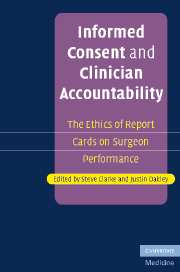Book contents
- Frontmatter
- Contents
- List of contributors
- Acknowledgements
- Introduction: Accountability, informed consent and clinician performance information
- Part I Accountability
- Part II Informed consent
- Part III Reporting performance information
- Part introduction
- 13 Is the reporting of an individual surgeon's clinical performance doing more harm than good for patient care?
- 14 Examining the link between publicly reporting healthcare quality and quality improvement
- 15 Hospital and clinician performance data: what it can and cannot tell us
- 16 An ethical analysis of the defensive surgery objection to individual surgeon report cards
- 17 Surgeon report cards and the concept of defensive medicine
- 18 Training, innovation and surgeons' report cards
- 19 Doctors' report cards: a legal perspective
- Index
- References
19 - Doctors' report cards: a legal perspective
Published online by Cambridge University Press: 08 August 2009
- Frontmatter
- Contents
- List of contributors
- Acknowledgements
- Introduction: Accountability, informed consent and clinician performance information
- Part I Accountability
- Part II Informed consent
- Part III Reporting performance information
- Part introduction
- 13 Is the reporting of an individual surgeon's clinical performance doing more harm than good for patient care?
- 14 Examining the link between publicly reporting healthcare quality and quality improvement
- 15 Hospital and clinician performance data: what it can and cannot tell us
- 16 An ethical analysis of the defensive surgery objection to individual surgeon report cards
- 17 Surgeon report cards and the concept of defensive medicine
- 18 Training, innovation and surgeons' report cards
- 19 Doctors' report cards: a legal perspective
- Index
- References
Summary
Introduction
The concept of report cards for doctors is one aspect of accountability for medical practitioners' conduct, success rates, efficiency and effectiveness in communication. Report cards for doctors and for health institutions at this stage have no formal legal status, although, like a variety of other documents, they have the potential to be utilized in an evidentiary sense as a yardstick for delineating acceptable from actionable conduct. In the past, ethical codes of conduct and practice, guidelines and protocols have all been used by both the civil courts and disciplinary tribunals as indicia of whether medical practitioners who have not complied fully with them have breached their duty of care to patients. An important question for the future is whether doctors' report cards can, or should, fulfil a similar function. If so, a secondary question is how they can be framed so as to minimize the potential for misuse.
The impetus toward enhanced professional accountability has been generated and facilitated by the law for two decades. It has become a core characteristic of latter-day tort law and disciplinary law, in particular, as the informed consent revolution continues to redefine what is required of medical practitioners' interactions with their patients.
This chapter contextualizes the phenomenon of doctors' report cards within the impetus toward greater accountability by health service providers. It contends that doctors' report cards are an inevitable development, against which doctors' performance to some extent will be measured, but that care needs to be taken in developing such report cards so that expectations are reasonable, so that the contents of report cards achieve their objectives and so that they do not have counter-productive consequences.
- Type
- Chapter
- Information
- Informed Consent and Clinician AccountabilityThe Ethics of Report Cards on Surgeon Performance, pp. 279 - 293Publisher: Cambridge University PressPrint publication year: 2007
References
- 2
- Cited by



